HARANA News, Thursday 20th Aban 1389 [11 Nov 2010] – In a letter written to [Ayatollah Ahmad] Jannati, Secretary General of the Guardian Council, by ten Muslim residents of Ivel village, reference is made to the 100 year residence in Ivel of Baha’is, who own more than 30 hectares of land and many homes, requesting that a price be set and ownership of the properties be transferred to Muslims. Mr. Jannati, in consultation with Mr. [‘Ali] Larijani, head of the judiciary, agreed that the properties belong to Ayatollah Khamanei, the Supreme Leader of Iran, and that the transfer of ownership would require that the Article 8 Foundation* of the Imam come on the scene. That letter is among the attachments.
As indicated by HARANA Reporters, following this development the Islamic Council of Ivel wrote a letter to neighbouring villages in which they ask these villages not to provide tractors to Baha’is, nor to help with the fall planting of the land, something that these Baha’is have done every year, inasmuch as the land supposedly “belongs to” the Supreme Leader and comes under the control of the Article 8 Foundation of the Imam. A copy of this letter is also attached.
Ivel village Baha’is, whose homes were destroyed this past summer, as they were carrying out their 27 year practice of planting their land, went to the Kiasar [a nearby village] court judge Nasseri and submitted to him a letter (dated 18/7/’89 [10 Oct 2010]) to this effect. The judge issued an order allowing them to plant, in coordination with, and with the personal attendance of,the Talma Darreh [a nearby village] military unit. The judge’s first letter was approved, and an order was issued to the military unit on 22/7/’89 [14 Oct 2010]. However, planting did not proceed, due to the lack of rain, and was delayed until a rainfall, following which the farmers went to Talma Darreh to obtain tractors. At that point they were faced by the letter from Ivel Council mentioned earlier. Therefore, they wrote a second letter to the Court, and the judge sent another order to allow them to plant dated 15/8/’89 [6 Nov 2010]. On that basis,Mr Fegh’hi provided two tractors to the Baha’is of Ivel, to enable them to do their planting. (both letters are attached [scans of the original letters in Persian see below])
Ivel Baha’i farmers, accompanied by Talma Darreh officials and two tractors, headed for Ivel village and their farms. They planted the land and the tractors began ploughing the fields, whereupon an Ivel Muslim named Hossein-gholi Ghaffari came to them, and stated that the land belonged to the Imam, and that no one had the right to plant it. He ordered the two tractor drivers to stop. The Military official asked him for an official letter to this effect, which he could not produce; therefore the officer ordered that the work continue. The man retorted that in another hour people would arrive from town and prevent the work, which is exactly what happened.
SafarAli Isma’ili, along with Feyzollah Isma’ili, Sayyid Javad Darakhshan, Mansoor Liali, NadAli Fallahpour, HosseinAli Rajabi and others came into the field; SafaAli in an angry tone dictatorially ordered that the tractors be turned off and that planting cease. The officer, Sgt KheshtZar, tried to persuade him to desist but it had no effect — he kept repeating that the land belonged to the Supreme Leader’s office, and that no one was allowed to plant in it. In the video clip, he is sitting on top of the tractor, talking. Due to the distance and the dangers involved in filming the event, his voice is not recorded, but he is insulting, belittling and cursing the Baha’i farmers who are around him, watching his ignorance, law-breaking and mischievous actions. As the possibility of violence existed, the Baha’is did not argue with him. At this point, officer KheshtZar left for his office so that he could relay the matter to his commander and the judge. Upon his return he ordered that the planting continue; the tractors drivers turned on their engines, but SafaAli, Feyzollah and Sayyid Javad stepped forward and prevented the work from proceeding. They sat on the tractors and in front of them, preventing the tractors from moving. This situation lasted for some time; as the work could not continue, KheshtZar told the Baha’is that he would stay there, but to avoid a confrontation, they should go to the officials and obtain a court order. So the Baha’is left and he prepared his report, dated 16/8/’89 [7 Nov], attached.
The next day, his report along with another letter were submitted to the Kiasar judge, informing him of what had transpired. The judge again approved the earlier order for planting. This letter dated 17/8/’89 [8 Nov], which is attached, was given to the military office, but as the commander was not available and no manpower was at hand, nothing happened. What did transpire was that, as with the destruction of the homes, most of the land was planted by these individuals in the dark of night. This had been anticipated; as had been observed the day before, they had been working on the property of the Baha’is. The matter had been reported again to the military officers who had verified this illegal activity in their night tour, but there was no action taken to prevent the criminal activity, so it was easily accomplished.
Today, 18/8/’89 [9 Nov], all that had happened was submitted in written form to judge Nasseri. As was expected, he issued an order that the land be planted under the supervision of the military office. The commander of the office, who had initially said that the judge’s order must be carried out and that it did not matter whether the farmer was Baha’i or Muslim or Jew, this time did not follow through. All the orders were just on paper. The law, the enforcer, the judge and his judgement, were all — as in the incident of the destruction of Baha’i homes — of no value or effect. But the actions of SafarAli, a retired enforcer who spent 30 years at the Justice Ministry, and his side-kick Rahim Liali at the Supreme Leader’s office and elsewhere, are the law, the enforcer, the judge, and the true legal force in the land. He entered the scene in the presence of representatives of the law and declared, as had happened before with the houses, that their war with Baha’i farmers of Ivel was like the Battle of Khaybar [a battle between Muhammad and a Jewish group — see http://en.wikipedia.org/wiki/Battle_of_Khaybar. The defeated Jews were forced to contribute tribute; later their land was confiscated.], removing Baha’is from the scene and clearing the space, destroying their homes and now taking over their land — and that the Supreme leader and his Foundation was the best vehicle for all this.
What happened during the summer, the destruction of more than 50 homes and animal barns and straw and feed containers of Baha’i farmers of Ivel, and now the confiscation of their land, part of which had been confiscated in 1362 [1983-4] after the expulsion of Baha’is in the name of the Prince of Martyrs [Imam Husayn], and now the remaining part being taken away and confiscated in the name of the Supreme Leader, are all evidence of the government-in-the-shadows acting against religious minorities and other groups, much more forcefully and colorfully than the seeming government.
Aban 1389 [Nov 2010].
* Article 8 of the Iranian Constitution reads: “In the Islamic Republic of Iran, al-‘amr bilma’ruf wa al-nahy ‘an al-munkar is a universal and reciprocal duty that must be fulfilled by the people with respect to one another, by the government with respect to the people, and by the people with respect to the government. The conditions, limits, and nature of this duty will be specified by law. (This is in accordance with the Qur’anic verse; “The believers, men and women, are guardians of one another; they enjoin the good and forbid the evil” [9:71]).
See a related video here: https://hra-news.org/Video/eyval002.mp4
Documents obtained in this respect:
—
Translation by Iran Press Watch
Source: http://www.iranpresswatch.org/fa/post/1615, http://www.hra-news.org/1389-01-27-05-24-07/5093-1.html

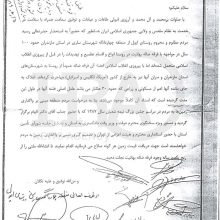
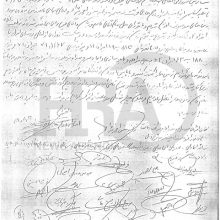
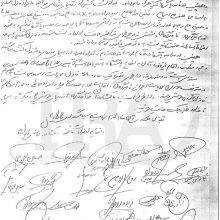
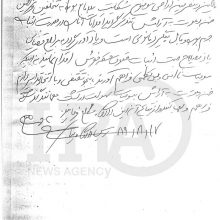
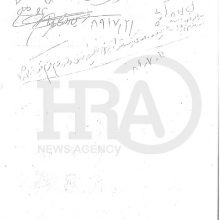
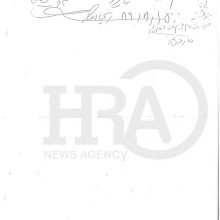
December 16, 2010 7:48 pm
I am horrified that Baha’is are treated with such bigotry in Iran. It is totally immoral that the so-called “Supreme Leader” has taken possession of Baha’i land and farms in Ivel, while the whole world watches this illegal theft of Baha’i lands.
I want all you Muslims reading this to know that I’m an American Indian and I’m proud to be a Baha’i and I love Muhammad. I have no hatred of Islam or the Qur’an. You must certainly be surprised that so many of my people, literally hundreds of thousands of American Indians on the whole Western Hemisphere from North to South have become Baha’is. By accepting Baha’u’llah as the Prophet of God for today, all of us (with no background in comparative religion) also lovingly accept the Divine Missions of the Bab and Muhammad and all the 12 Holy Imams who succeeded Muhammad. All Baha’is honor Muhammad, by accepting Baha’u’llah. Why don’t you see that this hatred Muslems have for Baha’is only weakens your arguments against the Baha’i Faith. love, Don